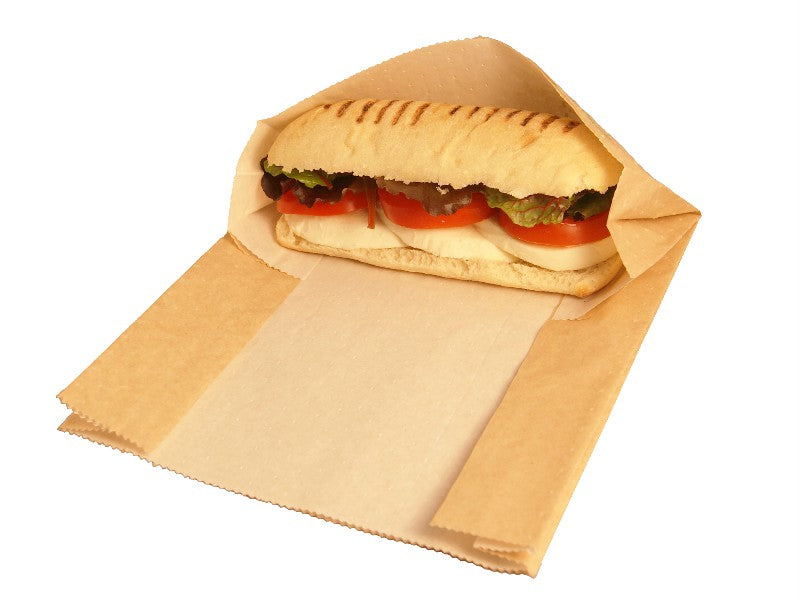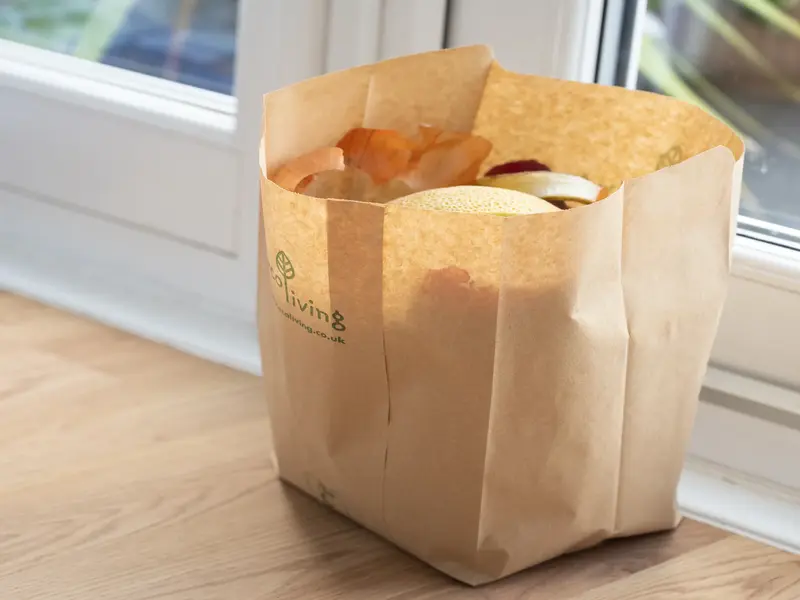Introduction
Paper bags are often used as an alternative to plastic bags, but people still have confusion about whether they are actually compostable. Well, as sustainability concerns grow for businesses and individuals, it is important to understand the composting process for brown paper bags. It requires a knowledge of the way the brown paper bags break down and whether or not you should send them to a compost bin.
Most paper bags are made from natural, biodegradable fibers, but some types of inks and coatings may affect their compostability. Hence, understanding this difference is important to ensure appropriate disposal. The guide below provides detailed information on everything you need to know about compostable paper bags. So, let’s go through it.

What Does “Compostable” Really Mean?
A material is said to be compostable when it can break down into non-toxic, natural components that help enrich soil. Compostable items can decompose with the help of microorganisms, such as fungi and bacteria.
These microorganisms convert them into humus, a nutrient-rich material that benefits plants by enhancing soil structure. The composting process leaves no harmful residues, so compostable products are safe for industrial and household systems.
A lot of people may be confused about the difference between biodegradable and compostable, but these two are completely different. Biodegradable materials break down with time with the help of nature, but they add no value to the soil. However, compostable materials decompose fully into organic matter, which fills the soil with nutrients.
Some conditions must be met for a successful compost, and these are:
- Oxygen, which helps with aerobic decomposition.
- Moisture that keeps the microbes active.
- Microorganisms that break down the material by feeding on it.
- The presence of warmth speeds up the process of composting.
In the presence of all these conditions, the composting process becomes cleaner and more efficient. Paper bags, which are uncoated and have no heavy dyes, may easily fit into this system as they are made with plant-based fiber. In the span of 2 to 6 weeks, they can break down and decompose in a compost pile.
When the concept of what a compostable bag is is clear, proper disposal of paper bags is ensured, and it even helps prevent contamination of compost bins, leading to healthy soil and sustainable waste management.
Are Paper Bags Compostable?
Most paper bags made from unbleached, uncoated kraft paper are compostable. As they are produced from natural wood fiber, they can break down in compost facilities and home composting settings. Brown paper bags are an option for packaging, and groceries can easily decompose due to their simple structure.
However, not all types of paper bags are suitable for composting. Some contain contaminants, and also bags coated with chemicals do not offer safe decomposition. Paper bags that are made of wax or plastic coatings, metallic prints, or heavy inks, or are prone to food contamination.
When the process of composting is conducted properly, the clean paper bags add carbon to the soil, which helps to balance food scraps and improve aeration in the compost pile. Also, shredded paper bags help speed up the breaking-down process.
By choosing paper bags that are free from food residue and coatings, the process of composting can be conducted safely, and it even reduces the overall waste, offering a well-balanced compost pile.
.jpg)
Brown Paper Bags vs. Coated or Printed Bags
A comparison between brown paper bags and coated or printed bags is given below. This comparison discusses the types of bags and their compostability:
| Type | Compostable? | Notes |
| Brown Kraft paper bag | Yes, it is compostable. | Fully compostable with minimal treatments added. |
| White or bleached bag | It can sometimes be compostable. | If it is not coated, white or bleached bags can be composted. |
| Coated or laminated paper bag | No, it is not compostable. | It contains synthetic layers, which make it non-compostable. |
| Printed paper bag | May or may not be. | It depends on the ink type used to print the bag. |
How to Compost Brown Paper Bags Correctly
The process of composting is one of the very crucial processes that plays a positive role in the overall environmental protection and also enriches the soil. The step-by-step process of composting is discussed below.
Tear into Small Pieces
The decomposition process speeds up when a shredded paper bag is used, as it provides microbes with more surface area to work on.
Mix with Green Waste
When you combine shredded paper bags with food scraps, vegetable trimmings, or coffee grounds, the carbon-to-nitrogen ratio in the compost is balanced.
Avoid Glossy Coatings or Tape
Check if the bag has any printed metallic designs, wax finishing, layers of plastic, or leftover tape. Make sure to remove any synthetic materials before composting to avoid complications.
Monitor Compost Moisture
Paper is good at absorbing water, so ensure keeping the compost damp. If it gets too dry, the process of decomposition will slow down due to the reduction in airflow.
Turn the Compost Regularly
By turning the compost daily, you can allow the oxygen to reach microbes, which ensures efficient breaking down of paper.
Check Progress Every 1 to 2 Weeks
Most of the brown paper bags require a few weeks to decompose. Keep checking the progress.

Environmental Benefits of Composting Paper Bags
There are various reasons that compel manufacturers to produce basic brown paper bags, one of the major reasons being their environmental friendliness. These paper bags are made from eco-friendly kraft paper, which vendors are now demanding for their grocery stores. They are a great alternative to plastic bags, and some of the environmental benefits of these bags are as follows:
- Composting ensures that paper bags stay out of landfills and reduces overall waste volume, easing pressure on landfills.
- In the landfills, paper is disposed of by producing methane in the absence of oxygen. Composting helps cut emissions with anaerobic breakdown.
- Paper bags add carbon to the organic matter, which enhances the soil structure and makes it nutrient-rich.
- Paper works like a brown carbon component, balancing the nitrogen-rich materials and offering a healthy, efficient compost.
- Paper contributes to soil health and plant growth, making it a valuable resource, enhancing the soil.
- Composting turns used paper and nutrients into compost, which supports plant life and creates a healthy cycle of tree to paper to compost to tree again.
- Compost has paper fiber, which adds natural nutrients and helps gardens and plants grow without synthetic fertilizers.
- Composting paper bags also makes people aware of the eco-friendly methods of disposal, which convinces suppliers to source them in bulk and supply them to the grocery stores.

Frequently Asked Questions: Are Paper Bags Compostable and How to Dispose of Them Responsibly?
Can I put brown paper bags in my compost bin?
Yes, uncoated kraft paper bags are completely compostable. They are made from natural fibers; however, you must ensure they do not have any glossy layers, unnecessary ink, or plastic coatings. If they are free of all contaminants, they can easily be part of your backyard compost pile.
Are all paper bags biodegradable?
Most paper bags are naturally biodegradable as they are derived from wood pulp. However, bags treated with chemicals or wax may leave behind unwanted residue or break down very slowly.
Can I compost paper bags with grease or food stains?
Light food stains or grease can compost without any problem, but paper bags that are too oily can slow the composting process and may require hot composting systems.
How long do paper bags take to compost?
Paper bags usually take 2 to 8 weeks to decompose. When the bags are thin and shredded, they decompose more quickly.
Which is better—recycling or composting paper bags?
Recycling is suitable for dry and clean paper bags, but composting is better for bags that are stained and are not accepted by recycling programs. The recycled paper bags are equally popular, along with compostable bags.
Conclusion
Paper bags made from uncoated brown kraft paper are extremely compostable and break down naturally into valuable organic matter. When such bags are added to a healthy compost system, they create a carbon-rich soil that enhances the overall quality of the plants.
Choosing to compost paper bags rather than disposing of them in landfills tends to reduce waste and cut methane emissions, supporting the composting cycle and promoting environmental friendliness. When you ensure that bags are free of inks and plastic coatings, you can always look forward to composting them and helping make the environment healthier.

Choose Compostable Paper Bags for a Greener Future
So, are you looking for 100% compostable shopping bags that help you play a positive role in the composting process and contribute to environmental friendliness? We at Tendee Accessory Shanghai Limited offer a wide range of paper bags that can be produced in bulk. You can also have them custom-designed for wholesale. Get in touch with us and play a fair share in sustainable living.





